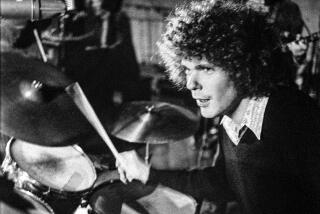Irving Gordon; Composer of ‘Unforgettable’
- Share via
Irving Gordon, a composer of popular songs who was best known for “Unforgettable,” which won him a Grammy four decades after he wrote it, has died. He was 81.
Gordon, who also wrote the recently revived “Prelude to a Kiss,” died Sunday in Los Angeles.
The wordsmith earned the song-of-the-year Grammy in 1992 after Natalie Cole included “Unforgettable” on her album of duets with original recordings by her late father, Nat King Cole. Gordon conceded that he didn’t think too much of his song when he wrote it in 1951, but changed his mind when the elder Cole played it, liked it and made it one of his signature hits.
“It’s nice to have a song come out that doesn’t scream, yell and have a nervous breakdown while it talks about tenderness,” he told a New York audience when he received the Grammy. “People . . . want a melody. They want to be able to sing a song.”
Gordon had written “Prelude to a Kiss,” giving title and lyrics to a tune by Duke Ellington, while riding a New York subway train in the late 1930s. Half a century later, the song enjoyed renewed popularity in connection with the play and motion picture of the same title.
Especially clever with titles, Gordon penned the song “Throw Momma From the Train,” which was recorded by Patti Page in 1956. In recent years, the title was used for a Danny DeVito film.
Other Gordon credits include lyrics for “What Will I Tell My Heart?” recorded by Bing Crosby, and “Me, Myself and I,” recorded by Billie Holiday. Those hits won him a songwriting contract with Ellington in 1937, and his career was launched.
In the 1940s and 1950s, Gordon churned out hits such as “Mr. and Mississippi” and “What Did Della Ware.”
Known for his literary plays on words, Gordon also wrote the classic comedy routine “Who’s on First,” which was made famous by Abbott and Costello.
By 1960, tastes in popular music had veered away from rhyming lyrics set to hummable melodies.
“All of a sudden, the old-timers, there was no market for them,” he told The Times in 1988. “So I became a tennis pro. I have many lives.”
He is survived by two sons, William and Richard, and one grandson, Jonathan.
More to Read
The biggest entertainment stories
Get our big stories about Hollywood, film, television, music, arts, culture and more right in your inbox as soon as they publish.
You may occasionally receive promotional content from the Los Angeles Times.









